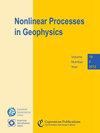部分观测动力系统的数据驱动重构
IF 2.4
4区 地球科学
Q3 GEOSCIENCES, MULTIDISCIPLINARY
引用次数: 1
摘要
摘要大气层或海洋的状态无法详尽地观察到。关键部分可能仍然无法得到适当的监测。此外,由于其复杂性,几乎不可能定义驱动大气和海洋的精确方程组。本文的目标是在不知道模型方程的情况下获得部分观测到的动力系统的预测。在这种数据驱动的背景下,本文重点关注Lorenz-63系统,其中只观察到第二和第三个分量,并且不允许访问方程。为了解决这些强大的约束,提出了一种将机器学习和数据同化技术相结合的方法。关键方面如下:引入潜在变量,对动力学进行线性近似,并迭代更新数据库,最大限度地提高可能性。我们发现,通过该过程推断的潜在变量与动力学系统的观测分量的连续导数有关。该方法还能够准确地重建部分观测系统的局部动力学。总的来说,所提出的方法简单,易于编码,即使在少量观测的情况下也能给出有希望的结果。本文章由计算机程序翻译,如有差异,请以英文原文为准。
Data-driven reconstruction of partially observed dynamical systems
Abstract. The state of the atmosphere, or of the ocean, cannot be exhaustively observed. Crucial parts might remain out of reach of proper monitoring. Also, defining the exact set of equations driving the atmosphere and ocean is virtually impossible because of their complexity. The goal of this paper is to obtain predictions of a partially observed dynamical system without knowing the model equations. In this data-driven context, the article focuses on the Lorenz-63 system, where only the second and third components are observed and access to the equations is not allowed. To account for those strong constraints, a combination of machine learning and data assimilation techniques is proposed. The key aspects are the following: the introduction of latent variables, a linear approximation of the dynamics and a database that is updated iteratively, maximizing the likelihood. We find that the latent variables inferred by the procedure are related to the successive derivatives of the observed components of the dynamical system. The method is also able to reconstruct accurately the local dynamics of the partially observed system. Overall, the proposed methodology is simple, is easy to code and gives promising results, even in the case of small numbers of observations.
求助全文
通过发布文献求助,成功后即可免费获取论文全文。
去求助
来源期刊

Nonlinear Processes in Geophysics
地学-地球化学与地球物理
CiteScore
4.00
自引率
0.00%
发文量
21
审稿时长
6-12 weeks
期刊介绍:
Nonlinear Processes in Geophysics (NPG) is an international, inter-/trans-disciplinary, non-profit journal devoted to breaking the deadlocks often faced by standard approaches in Earth and space sciences. It therefore solicits disruptive and innovative concepts and methodologies, as well as original applications of these to address the ubiquitous complexity in geoscience systems, and in interacting social and biological systems. Such systems are nonlinear, with responses strongly non-proportional to perturbations, and show an associated extreme variability across scales.
 求助内容:
求助内容: 应助结果提醒方式:
应助结果提醒方式:


